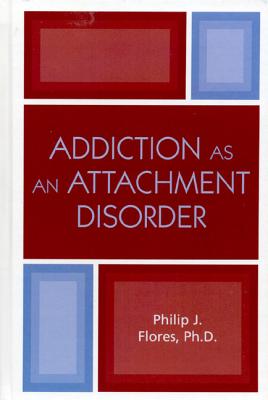Addiction as an Attachment Disorder

Addiction as an Attachment Disorder
From the Foreword: Addiction is a disorder in self-regulation. Individuals who become dependent on addictive substances cannot regulate their emotions, self-care, self-esteem, and relationships. In this monumental and illuminating text Philip Flores covers all the reasons why this is so. But it is the domain of interpersonal relations that he makes clear why individuals susceptible to substance use disorders (SUDs) are especially vulnerable. His emphasis on addiction as an attachment disorder is principally important because he provides extensive scholarly and clinical insights as to why certain vulnerable individuals so desperately need to substitute chemical solutions and connections for human ones. The strength of Flores's paradigm of addiction as an attachment disorder is that it is a theory that effectively and wisely guides treatment, but at the same time, when properly implemented or practiced, the treatment resonates with and further enhances the theory. Flores's work here is an extraordinary one because, in parsimonious and clear language, he makes a major contribution to the literature and practice of effective psychotherapy in general and effective psychotherapy for the addictions in particular. He fills in all the gaps between theory and practice covering wide and ranging issues of what practice and empirical findings have to teach about the critical ingredients of AA, group therapy, and individual psychotherapy. This is a job well done because it helps students and experienced clinicians alike to always be mindful of how they bring their humanity to the distress and suffering of others. His theory of addiction as an attachment disorder makes it particularly clear how especially important this is for those suffering with addictive disorders. --Edward J. Khantzian, M.D., clinical professor of psychiatry, Harvard Medical School A Jason Aronson Book
613.80Lei
613.80Lei
Livrare in 2-4 saptamani
Descrierea produsului
From the Foreword: Addiction is a disorder in self-regulation. Individuals who become dependent on addictive substances cannot regulate their emotions, self-care, self-esteem, and relationships. In this monumental and illuminating text Philip Flores covers all the reasons why this is so. But it is the domain of interpersonal relations that he makes clear why individuals susceptible to substance use disorders (SUDs) are especially vulnerable. His emphasis on addiction as an attachment disorder is principally important because he provides extensive scholarly and clinical insights as to why certain vulnerable individuals so desperately need to substitute chemical solutions and connections for human ones. The strength of Flores's paradigm of addiction as an attachment disorder is that it is a theory that effectively and wisely guides treatment, but at the same time, when properly implemented or practiced, the treatment resonates with and further enhances the theory. Flores's work here is an extraordinary one because, in parsimonious and clear language, he makes a major contribution to the literature and practice of effective psychotherapy in general and effective psychotherapy for the addictions in particular. He fills in all the gaps between theory and practice covering wide and ranging issues of what practice and empirical findings have to teach about the critical ingredients of AA, group therapy, and individual psychotherapy. This is a job well done because it helps students and experienced clinicians alike to always be mindful of how they bring their humanity to the distress and suffering of others. His theory of addiction as an attachment disorder makes it particularly clear how especially important this is for those suffering with addictive disorders. --Edward J. Khantzian, M.D., clinical professor of psychiatry, Harvard Medical School A Jason Aronson Book
Detaliile produsului










